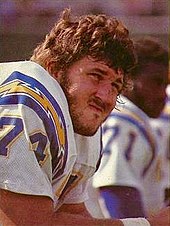
The Los Angeles Chargers are a professional American football team based in the Greater Los Angeles area. The Chargers compete in the National Football League (NFL) as a member of the American Football Conference (AFC) West division. The team plays its home games at SoFi Stadium in Inglewood, California, which it shares with the Los Angeles Rams.

Frederick Rudolph Dean was an American professional football player who was a defensive end in the National Football League (NFL). A two-time first-team All-Pro and a four-time Pro Bowler, he won two Super Bowls with the San Francisco 49ers. He was inducted into the Pro Football Hall of Fame in 2008.

Daniel Francis Fouts is an American former professional football quarterback who played for the San Diego Chargers of the National Football League (NFL) throughout his 15-season career (1973–1987). After a relatively undistinguished first five seasons in the league, Fouts came to prominence as an on-field leader during the Chargers' Air Coryell period. He led the league in passing yards every year from 1979 to 1982, throwing for over 4,000 yards in the first three of these—no quarterback had previously posted consecutive 4,000-yard seasons. Fouts was voted a Pro Bowler six times, first-team All-Pro twice, and in 1982 he was the Offensive Player of the Year. He was elected to the Pro Football Hall of Fame in 1993, his first year of eligibility.
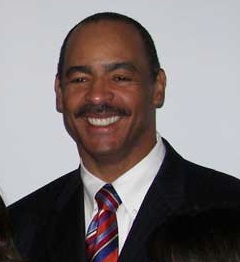
Kellen Boswell Winslow Sr. is an American former professional football tight end who played in the National Football League (NFL). A member of the Pro Football Hall of Fame (1995), he is widely recognized as one of the greatest tight ends in the league's history. Winslow played his entire NFL career (1979–1987) with the San Diego Chargers after being selected in the first round of the 1979 NFL draft. He played college football for the Missouri Tigers, earning consensus All-American honors in 1978. He was inducted into the College Football Hall of Fame in 2002.

Charles Joiner Jr. is an American former professional football wide receiver who played in the American Football League (AFL) and National Football League (NFL) for 18 seasons. He played 11 seasons with the San Diego Chargers, with whom he earned all three of his Pro Bowl selections, and was named first-team All-Pro by the Associated Press in 1980. He was inducted into the Pro Football Hall of Fame in 1996.

Rolf Joachim Benirschke is an American former professional football player who was a placekicker in the National Football League (NFL). He played for the San Diego Chargers from 1977 until 1986. He is probably most known for missing a potential 27-yard game-winning field goal in overtime of the playoff game known as the "Epic in Miami” but then getting a second chance and connecting from 29 yards fourteen minutes into overtime to win the game on January 2, 1982.

Gary Lynn "Big Hands" Johnson was an American professional football player who was a defensive tackle in the National Football League (NFL). He was a four-time All-Pro and a four-time Pro Bowl selection. He played the majority of his NFL career with the San Diego Chargers, and he was inducted into the Chargers Hall of Fame.
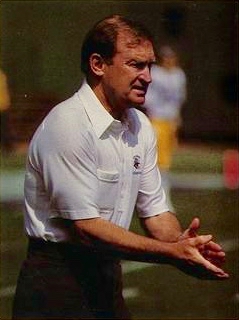
Donald David Coryell was an American football coach. He coached in high school, college, and the professional ranks; his most notable NCAA post was with the San Diego State Aztecs, then he moved on to the National Football League (NFL), first with the St. Louis Cardinals from 1973 to 1977 and then the San Diego Chargers from 1978 to 1986. Well known for his innovations in football's passing game, in particular the Air Coryell offense he created with the Chargers, Coryell was the first head coach to win more than 100 games at both the collegiate and professional levels. He was inducted into the Chargers Hall of Fame in 1994, the College Football Hall of Fame in 1999, and the Pro Football Hall of Fame in 2023.

Russell Eugene Washington was an American professional football offensive tackle who played for the San Diego Chargers of the American Football League (AFL) and National Football League (NFL) from 1968 to 1982, playing his first two seasons as a defensive tackle. He was taken in the first round of the 1968 NFL/AFL draft. He played college football for the Missouri Tigers.

Jerome Anthony Smith was an American football player and coach. Jerry was born in Dayton, Ohio and attended Chaminade High School, graduating in 1948. At Chaminade he played tight end and later in 1982 was elected to the school's Athletic Hall of Fame.
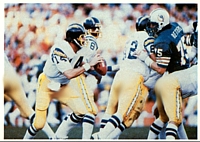
The Epic in Miami was the National Football League AFC divisional playoff game between the San Diego Chargers and Miami Dolphins that took place on January 2, 1982 in the Miami Orange Bowl. The game, won by the Chargers in overtime, 41–38, is one of the most famous in National Football League lore because of the enormity of scoring, the conditions on the field, the performances of players on both teams, and the numerous records that were set.
Lowell Douglas English is an American former professional football player who was a defensive tackle for the Detroit Lions from 1975 to 1985 of the National Football League (NFL). He played college football for the Texas Longhorns.
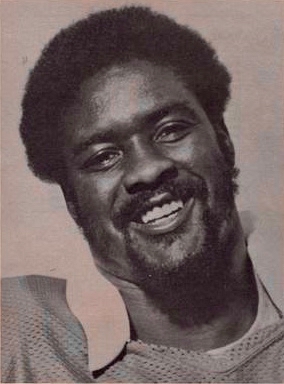
Douglas Wilkerson was an American professional football player who was a guard in the National Football League (NFL) for the Houston Oilers and San Diego Chargers. Named to the Pro Bowl three times, he was also a three-time All-Pro, including a first-team selection in 1982. He was inducted into the Chargers Hall of Fame. He also played one season in the Austrian Football League for the Graz Giants in 1987.

The San Diego Chargers were a professional American football team in the National Football League (NFL). The Chargers played in San Diego from 1961 until the end of the 2016 season, before relocating back to the Greater Los Angeles area, where the franchise played its inaugural 1960 season. The team is now known as the Los Angeles Chargers.
Leroy Jones was an American professional football player who was a defensive end. He played the majority of his 11-year career with the San Diego Chargers in the National Football League (NFL).

In American football, Air Coryell is the offensive scheme and philosophy developed by former San Diego Chargers coach Don Coryell. The offensive philosophy has been also called the "Coryell offense" or the "vertical offense".

The 1980 San Diego Chargers season was the franchise's 11th season in the National Football League (NFL), and its 21st overall. The team failed to improve on their 12–4 record in 1979 and finished 11–5, though they won the AFC West and gained the top seed in the AFC playoffs for the second consecutive season. Their season ended in the AFC Championship Game when they lost to their divisional rivals and the eventual Super Bowl champions, the Oakland Raiders.

The 1975 San Diego Chargers season was the franchise's sixth season in the National Football League (NFL) and its 16th overall. The team were seeking to improve on their 5–9 record in 1974, but they lost their first eleven games amidst home attendances that dipped under 30,000.
The Bruise Brothers were a group of American football players who played on the defensive line for the San Diego Chargers in the National Football League (NFL). The foursome, consisting of Fred Dean, Gary Johnson, Louie Kelcher, and Leroy Jones, formed one of the most dominant lines of their era. The Chargers selected Johnson, Kelcher, and Dean in the first two rounds of the 1975 NFL draft, and traded for Jones the following year. They helped San Diego lead the league in sacks in 1980.
Johnny Sanders was an American professional football executive in the National Football League (NFL). He was the general manager of the San Diego Chargers for 11 seasons from 1976 until 1986, developing them into a Super Bowl contender. He was named the NFL executive of the year by Sporting News in 1979.

